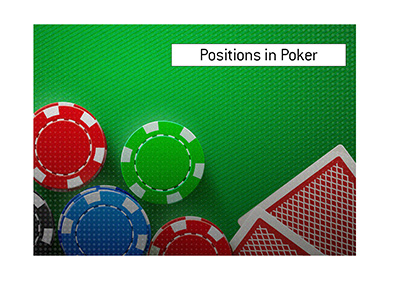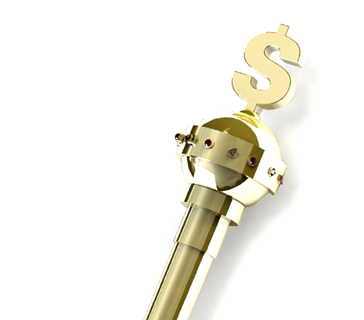A Look at the Different Positions in Poker
Q: What are the Different Positions in Poker?
A: In order to excel at the game of poker, a player needs to know the importance of position.
Strong players know the advantage that lies in being the button vs sitting UTG. Casual players largely don't have the same concept of position and its overwhelming importance in the game of poker.
 Let's take a traditional 10-handed poker table. The table is divided into four sections and ranked in order from weakest to strongest position:
Let's take a traditional 10-handed poker table. The table is divided into four sections and ranked in order from weakest to strongest position:1. The Blinds
2. Early Position
3. Middle Position
4. Late Position
In short, the later your position in the hand, the more of an advantage that you have over the other players at the table.
The worst position to be in during a hand is the Small Blind, while the best position to be in is the Button (dealer).
Here are the ten different positions at the table and what they are called:
1. Small Blind
2. Big Blind
3. Under the Gun (UTG)
4. Under the Gun + 1 (UTG+1)
5. Under the Gun + 2 (UTG+2)
6. Middle Position 1 (MP1)
7. Middle Position 2 (MP2)
8. Middle Position 3 (MP3)
9. Cut Off
10. Button
Now, let's break down these positions:
The small blind is the player that is directly to the left of the dealer. The small blind has the worst position at the table.
The big blind pays a full big blind to play in the hand, while the small blind usually pays half. The big blind sits two to the left of the dealer.
The Under the Gun player is the first player to act when a hand starts. They are considered to be in "early position".
The UTG+1 player sits to the left of the Under the Gun player. The UTG+2 player sits to the left of the UTG+1 player and two to the left of the UTG player.
After that, we get the three middle position players - MP1, MP2 and MP3.
After that, we get the late position players, starting with the cutoff, who has the second best starting position at the table.
Finally, we get the button, who has the strongest starting position at the table. Once the flop has been dealt, the button will be the last to act in any hand, which is a massive advantage.
-
Generally speaking, the later you are to act in a hand, the weaker your holding needs to be to put in an opening raise. Blind stealing is very important to accumulate chips over the course of a cash game or tournament, though stronger players in the small blind and big blind will realize this and re-raise with weaker hands themselves to put pressure on a button player that may be trying to steal the blinds.
Back to Answers

